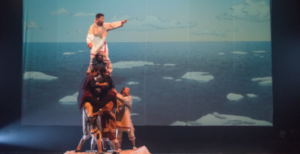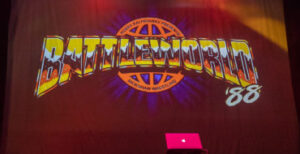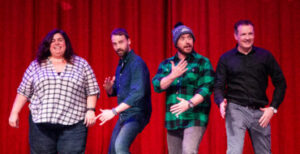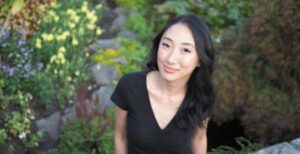
James Gangl ‘s one-man show is not only about his desire to have a sexual relationship with the hot lingerie model he meets while shooting a Coors Light commercial but with having a sexual relationship in general.
Gangl was raised Catholic (he can rattle off a list of Saints and their purpose/role) and frivolous sexual relationships are not part of this Catholic education. However, he doesn’t just want to have crazy sex to assuage his revving libido, he also wants a relationship with this girl (“Ski Bunny #3” in the commercial). Unfortunately, he is a bit awkward and a serious victim of verbal diarrhoea, which often results in him spouting off a list of unfunny puns (yes, some puns
can be funny) instead of the witty jokes he presumably has running through his head. Luckily, when the commercial wraps James finds himself alone with Bunny #3 at an after party. He has a new found confidence, aided by alcohol and drugs that enables him to have a one-on-one conversation with the beautiful girl he so desperately desires. They don’t end up having sex but instead, end a wonderful evening of conversation and “connection” by leaving separately to go to their own rooms. The next morning, Gangl remembers the night he had with Bunny #3 and panics. How can he talk to her now without the aid of his liquid confidence. Amusingly, Gangl literally
flees the airport without any parting words to the object of his affection but it definitely does not end there.
Gangl’s monologue is funny and enlightening which I feel is based solely on Gangl’s abilities as a storyteller. This does not mean his story is not funny, oh it is, it just means that
Sex, Religion & Other Hang-Ups is entertaining because of the writer’s likable personality, enthusiasm and brutal honesty. Gangl even takes the time to interact with his audience by stopping his monologue to ask if an audience members’ sneeze was a duck quacking or an actual sneeze, but also stops to make fun of himself. For example, at one point he wants to read a poem from the journal he kept while he was working through his feelings for Bunny #3. The post-it note marking the poem he wanted to read from falls out, resulting in him losing his spot. Gangl halts the show to tell us what has just occurred and then enlists the audience’s help to pick one randomly. Upon reading “Dashboard Séance”, the audience chuckles at various parts (it verges ever so greatly onto true Emo territory) and Gangl himself shrugs knowingly at how silly the poem is now, albeit meaningful when he wrote it several years ago.
It is this self-deprecating humour that endears him to his audience more so than the humorous material he is presenting to us. At the beginning of the show Gangl demonstrates his honesty and realism by inviting the audience to drift in and out when they deem fit, you know, in case you want to reflect on how you are relating to the show’s material. Who does that? Someone who knows that this will likely occur, as we are all human, but also someone who knows that there are moments that you may actually drift in and out because you are thinking of other things not even related to the show or its material. That is, Gangl gives the audience permission not to pay attention to him or what he is saying. It will not offend him in the slightest; he understands that this is natural.
In the midst of recanting his personal experiences, Gangl effectively demonstrates that relationships are difficult not just because of sex or religion but because we often blur the lines between sex, intimacy, relationships and our gendered societal roles. While I cannot say I did not drift in and out a bit during his 75 minute show, I can say that I fully enjoyed Gangl’s tale of
Sex, Religion & Other Hang-Ups, especially the very funny final 3 minutes which concludes his comical story very nicely. After the show, I purchased a book of Gangl’s poetry written around the time he met Bunny #3, entitled “Journal of My Meltdown”. The price for this collection is decided by the customer (I donated $4 for this extra entertainment). My personal favorites? “Limbo”, “Easy Love” and one of his many “Untitled” poems.
 James Gangl ‘s one-man show is not only about his desire to have a sexual relationship with the hot lingerie model he meets while shooting a Coors Light commercial but with having a sexual relationship in general.
Gangl was raised Catholic (he can rattle off a list of Saints and their purpose/role) and frivolous sexual relationships are not part of this Catholic education. However, he doesn’t just want to have crazy sex to assuage his revving libido, he also wants a relationship with this girl (“Ski Bunny #3” in the commercial). Unfortunately, he is a bit awkward and a serious victim of verbal diarrhoea, which often results in him spouting off a list of unfunny puns (yes, some puns can be funny) instead of the witty jokes he presumably has running through his head. Luckily, when the commercial wraps James finds himself alone with Bunny #3 at an after party. He has a new found confidence, aided by alcohol and drugs that enables him to have a one-on-one conversation with the beautiful girl he so desperately desires. They don’t end up having sex but instead, end a wonderful evening of conversation and “connection” by leaving separately to go to their own rooms. The next morning, Gangl remembers the night he had with Bunny #3 and panics. How can he talk to her now without the aid of his liquid confidence. Amusingly, Gangl literally flees the airport without any parting words to the object of his affection but it definitely does not end there.
Gangl’s monologue is funny and enlightening which I feel is based solely on Gangl’s abilities as a storyteller. This does not mean his story is not funny, oh it is, it just means that Sex, Religion & Other Hang-Ups is entertaining because of the writer’s likable personality, enthusiasm and brutal honesty. Gangl even takes the time to interact with his audience by stopping his monologue to ask if an audience members’ sneeze was a duck quacking or an actual sneeze, but also stops to make fun of himself. For example, at one point he wants to read a poem from the journal he kept while he was working through his feelings for Bunny #3. The post-it note marking the poem he wanted to read from falls out, resulting in him losing his spot. Gangl halts the show to tell us what has just occurred and then enlists the audience’s help to pick one randomly. Upon reading “Dashboard Séance”, the audience chuckles at various parts (it verges ever so greatly onto true Emo territory) and Gangl himself shrugs knowingly at how silly the poem is now, albeit meaningful when he wrote it several years ago.
It is this self-deprecating humour that endears him to his audience more so than the humorous material he is presenting to us. At the beginning of the show Gangl demonstrates his honesty and realism by inviting the audience to drift in and out when they deem fit, you know, in case you want to reflect on how you are relating to the show’s material. Who does that? Someone who knows that this will likely occur, as we are all human, but also someone who knows that there are moments that you may actually drift in and out because you are thinking of other things not even related to the show or its material. That is, Gangl gives the audience permission not to pay attention to him or what he is saying. It will not offend him in the slightest; he understands that this is natural.
In the midst of recanting his personal experiences, Gangl effectively demonstrates that relationships are difficult not just because of sex or religion but because we often blur the lines between sex, intimacy, relationships and our gendered societal roles. While I cannot say I did not drift in and out a bit during his 75 minute show, I can say that I fully enjoyed Gangl’s tale of Sex, Religion & Other Hang-Ups, especially the very funny final 3 minutes which concludes his comical story very nicely. After the show, I purchased a book of Gangl’s poetry written around the time he met Bunny #3, entitled “Journal of My Meltdown”. The price for this collection is decided by the customer (I donated $4 for this extra entertainment). My personal favorites? “Limbo”, “Easy Love” and one of his many “Untitled” poems.
James Gangl ‘s one-man show is not only about his desire to have a sexual relationship with the hot lingerie model he meets while shooting a Coors Light commercial but with having a sexual relationship in general.
Gangl was raised Catholic (he can rattle off a list of Saints and their purpose/role) and frivolous sexual relationships are not part of this Catholic education. However, he doesn’t just want to have crazy sex to assuage his revving libido, he also wants a relationship with this girl (“Ski Bunny #3” in the commercial). Unfortunately, he is a bit awkward and a serious victim of verbal diarrhoea, which often results in him spouting off a list of unfunny puns (yes, some puns can be funny) instead of the witty jokes he presumably has running through his head. Luckily, when the commercial wraps James finds himself alone with Bunny #3 at an after party. He has a new found confidence, aided by alcohol and drugs that enables him to have a one-on-one conversation with the beautiful girl he so desperately desires. They don’t end up having sex but instead, end a wonderful evening of conversation and “connection” by leaving separately to go to their own rooms. The next morning, Gangl remembers the night he had with Bunny #3 and panics. How can he talk to her now without the aid of his liquid confidence. Amusingly, Gangl literally flees the airport without any parting words to the object of his affection but it definitely does not end there.
Gangl’s monologue is funny and enlightening which I feel is based solely on Gangl’s abilities as a storyteller. This does not mean his story is not funny, oh it is, it just means that Sex, Religion & Other Hang-Ups is entertaining because of the writer’s likable personality, enthusiasm and brutal honesty. Gangl even takes the time to interact with his audience by stopping his monologue to ask if an audience members’ sneeze was a duck quacking or an actual sneeze, but also stops to make fun of himself. For example, at one point he wants to read a poem from the journal he kept while he was working through his feelings for Bunny #3. The post-it note marking the poem he wanted to read from falls out, resulting in him losing his spot. Gangl halts the show to tell us what has just occurred and then enlists the audience’s help to pick one randomly. Upon reading “Dashboard Séance”, the audience chuckles at various parts (it verges ever so greatly onto true Emo territory) and Gangl himself shrugs knowingly at how silly the poem is now, albeit meaningful when he wrote it several years ago.
It is this self-deprecating humour that endears him to his audience more so than the humorous material he is presenting to us. At the beginning of the show Gangl demonstrates his honesty and realism by inviting the audience to drift in and out when they deem fit, you know, in case you want to reflect on how you are relating to the show’s material. Who does that? Someone who knows that this will likely occur, as we are all human, but also someone who knows that there are moments that you may actually drift in and out because you are thinking of other things not even related to the show or its material. That is, Gangl gives the audience permission not to pay attention to him or what he is saying. It will not offend him in the slightest; he understands that this is natural.
In the midst of recanting his personal experiences, Gangl effectively demonstrates that relationships are difficult not just because of sex or religion but because we often blur the lines between sex, intimacy, relationships and our gendered societal roles. While I cannot say I did not drift in and out a bit during his 75 minute show, I can say that I fully enjoyed Gangl’s tale of Sex, Religion & Other Hang-Ups, especially the very funny final 3 minutes which concludes his comical story very nicely. After the show, I purchased a book of Gangl’s poetry written around the time he met Bunny #3, entitled “Journal of My Meltdown”. The price for this collection is decided by the customer (I donated $4 for this extra entertainment). My personal favorites? “Limbo”, “Easy Love” and one of his many “Untitled” poems. 








